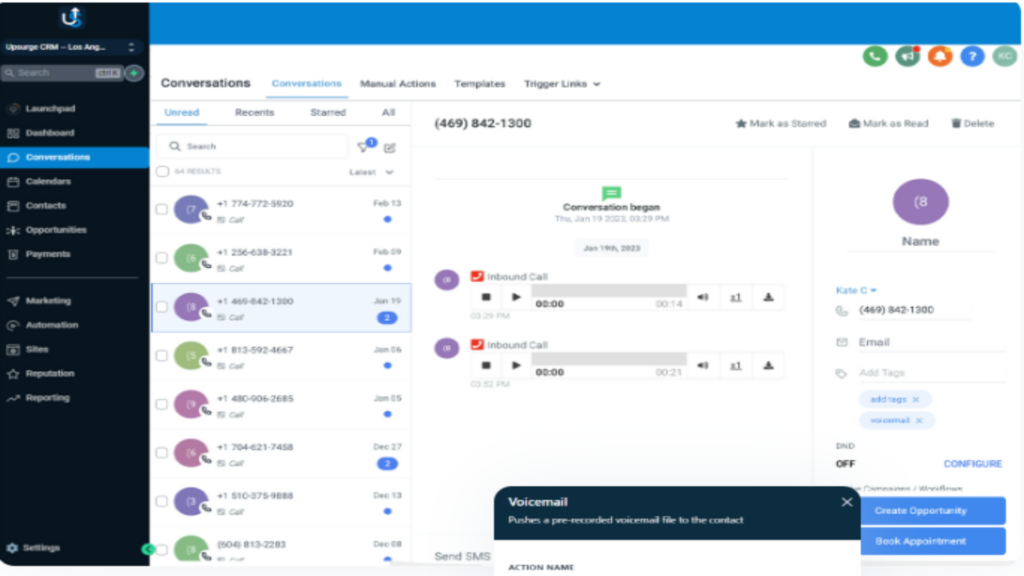
CRM for law firms is a transformative force in the competitive legal services landscape, streamlining case management and bolstering client relations. CRM software, tailored explicitly for legal practices like UpsurgeCRM, empowers attorneys with advanced client intake process capabilities, meticulous client data management, and relationship management tools. As law firms grapple with the complexities of new client portfolios and strive to maintain enduring client relationships, integrating a dedicated law firm CRM is no longer a luxury—it’s a necessity.
This article focuses on CRM strategies’ pivotal role in enhancing case management’s effectiveness within law firms. We will dissect the multilayered benefits of legal CRM software, from automating practice management software functions to harnessing marketing automation for growth. Whether you’re looking to refine your firm’s client relationship management or optimize your CRM system to help law firms manage their workload more effectively, the insights provided here, including a look at Upsurge CRM with its compelling free trial offer, are designed to gear your practice towards a future of increased efficiency and strengthened client trust.
Case management in law firms is a complex endeavor. It encompasses the meticulous scheduling, organization, and tracking of case-related activities. Effective case management is the bedrock upon which legal services are built, ensuring that no detail is overlooked, deadlines are met, and clients remain informed throughout their legal journey. With a robust case management system, law firms can avoid inefficiency, client dissatisfaction, and, potentially, the loss of business.

Implementing case management processes also plays a pivotal role in maintaining healthy client relations. It is how a firm demonstrates its commitment to a client’s case, providing them with a sense of security and assurance that their legal matters are in capable hands.
CRM systems have ushered in a revolutionary approach to case management in law firms. Integrating CRM tools into daily legal processes makes interactions with each case more systematic and streamlined. These systems often come with advanced features, such as automation of routine tasks and comprehensive data management, which free up attorneys to focus on more substantive legal work.
CRM in case management processes yields a holistic view of each case, providing unparalleled oversight and allowing for a 360-degree view of all case-related activities. This level of insight is crucial for adapting strategies to meet the evolving needs of clients and their cases.

Case management is at the heart of legal practice, demanding precision, efficiency, and responsiveness. The integration of a Customer Relationship Management (CRM) system can thoroughly enhance the way attorneys manage their cases. A well-deployed CRM can be the difference between a case that is handled smoothly and one that struggles through to resolution. Here are the essential strategies for optimizing case management using CRM software.
Law firms have unique needs that differ significantly from other businesses. For a CRM to be effective, it must be customized to fit the specific workflow of a legal practice. This includes automating routine tasks, organizing client information, and tracking case progress. Customization ensures that attorneys spend less time on administrative tasks and more time on legal work that requires their expertise.
One of the greatest strengths of a CRM is its ability to act as a centralized repository for all client and case-related data. Having a single source of truth eliminates data silos and ensures that every team member has access to the most up-to-date information. This includes contact details, communication logs, case documents, court dates, and billing information. Centralized data improves coordination and reduces the chances of errors that can occur with disparate information sources.

CRM systems can automate many client communication tasks, such as appointment reminders, case updates, and follow-up emails. Automated communication ensures that clients are kept in the loop at every stage of their case, without the need for manual intervention from the legal team. This not only improves client satisfaction but also saves valuable time for the firm.
CRMs provide powerful analytics tools that can offer insights into client behavior, case trends, and firm performance. Law firms can use CRM analytics to identify common case bottlenecks, predict outcomes based on historical data, and make data-driven decisions to improve their services. These insights can help firms to better allocate resources, focus on profitable practice areas, and improve overall case strategies.
Legal cases involve multiple deadlines that must be met without fail. CRMs can track all critical deadlines and automate task assignments, ensuring that nothing falls through the cracks. This level of organization helps in maintaining a firm’s reputation and can significantly reduce the stress associated with managing complex cases.

Law firms often have multiple people working on a single case. A CRM with collaborative tools allows team members to share information quickly and work together more effectively. Features like shared calendars, document collaboration, and real-time updates help keep everyone on the same page and streamline case progression.
Client information is sensitive and subject to various privacy laws and regulations. CRMs designed for legal practices include strong security measures to protect client data and ensure that firms comply with industry standards. Regular security audits and compliance checks should be a built-in feature of any legal CRM system.
An effective CRM should integrate seamlessly with other legal practice software like case management systems, billing software, and document management tools. Integration creates a cohesive technology ecosystem that simplifies case management processes and avoids the inefficiencies of switching between multiple platforms.

At its core, CRM is about building and maintaining client relationships. A CRM system should enable law firms to adopt a client-centric approach by providing personalized experiences, responding promptly to inquiries, and understanding individual client needs. Happy clients are more likely to return and refer new business, which is critical for the growth of any legal practice.

The legal industry is continuously evolving, and so should a firm’s CRM system. Regularly updating the CRM software, soliciting feedback from users, and making iterative improvements ensures that the system stays aligned with the firm’s goals and market trends. This process of continuous improvement helps firms maintain a competitive edge.
CRM systems are an invaluable asset for law firms looking to enhance their case management practices. The strategies outlined above highlight the potential of CRM to streamline workflows, improve client communication, and strengthen the overall efficiency of legal practice. By incorporating these strategies and continuously adapting to new developments, law firms can ensure they provide the highest level of service to their clients while staying ahead in a competitive industry.

When it comes to case management in law firms, the choice of CRM software can make a significant difference. UpsurgeCRM stands out as a leading solution, offering law firms a comprehensive and customized approach to managing their client relationships and case workflows. Below we explore why UpsurgeCRM is the best choice for law firms looking to enhance their case management capabilities.
UpsurgeCRM has been crafted with the specific demands of legal case management in mind. Its suite of tools is fine-tuned to facilitate the organization, tracking, and management of cases from inception to conclusion. With UpsurgeCRM, law firms can navigate the intricacies of each case, ensuring that every client receives meticulous attention to detail and outstanding representation.
A cornerstone feature of UpsurgeCRM is its ability to centralize all case-related information in a unified database. This central repository enables easy access to case details, client communications, and document management, which is essential for maintaining consistency and ensuring all team members are working from the most current information. With a structured system in place, the risk of miscommunication or missed opportunities is greatly reduced.
Recognizing that time is of the essence in legal practice, UpsurgeCRM introduces powerful automation tools to streamline routine case management tasks. Automated alerts, reminders, and scheduling ensure that critical deadlines are never missed. Furthermore, document automation helps in preparing standard legal forms and correspondence quickly, freeing up valuable time for legal analysis and strategy development.
In the pursuit of continuous improvement in case management, UpsurgeCRM provides advanced analytics that delivers deep insights into case progress, performance metrics, and client satisfaction levels. These insights empower law firms to make data-driven decisions that refine their case management strategies, optimize resource allocation, and ultimately enhance the quality of their legal services.

Lawyers are well aware that missed deadlines can lead to dire consequences for their cases and clients. UpsurgeCRM integrates task and deadline management tools that are indispensable for keeping cases on track. With intuitive interfaces and real-time updates, every member of the law firm can stay informed on case milestones and upcoming obligations.
Securing sensitive client data and maintaining compliance with legal standards is a priority for any law firm. UpsurgeCRM commits to the highest levels of security and compliance, incorporating strict protocols and regular system updates to protect against data breaches and ensure adherence to legal regulations.
A key advantage of UpsurgeCRM is its ability to integrate seamlessly with existing legal tools and software used by the firm. This integration facilitates a cohesive and efficient case management process, allowing for a smooth workflow that capitalizes on the strengths of each integrated system.

UpsurgeCRM stands out not just for its current capabilities, but also for its dedication to evolution and adaptation. The platform is continuously updated to meet the shifting demands of the legal industry, ensuring that law firms are always equipped with cutting-edge case management tools.
For law firms that place a premium on efficient, effective, and reliable case management, UpsurgeCRM is the clear solution. By focusing on the specific needs of legal professionals and their cases, UpsurgeCRM delivers a comprehensive system that streamlines case workflows, enhances productivity, secures client data, and ensures that firms stay ahead in a competitive landscape. To experience firsthand how UpsurgeCRM can revolutionize your firm’s case management approach, explore the possibilities at UpsurgeCRM.
Adopting CRM systems in law firms is not just about remaining competitive; it’s about setting a new standard in client service and case efficiency. Integrating Upsurge CRM into your legal practice offers a pathway to achieve this, ensuring that every client interaction and case detail is managed precisely and carefully.
As we’ve explored, Upsurge CRM’s tailored features and seamless integration capabilities can significantly enhance how law firms manage their operations. With Upsurge CRM, you can simplify your case management, deepen client relationships, and ensure data security. Embrace the future of legal practice management by starting with a free trial of Upsurge CRM and experience how it can transform your firm’s approach to case management. Your journey toward operational excellence is just one click away.
In pursuing an effective, seamless, intuitive lead generation solution, Upsurge CRM emerges as the partner of choice for entrepreneurs and startups eager to amplify their sales potential. Tailored to meet the extraordinary demands of growing businesses, Upsurge CRM offers an innovative platform that elevates lead generation to new heights.

The Real Benefits of Contact Management with CRM for Collecting Customer Data Managing and leveraging customer information has become a foundational aspect of success…
Can a CRM Really Automate My Sales Follow-Ups and Boost My Small Business Revenue? Small businesses face increasing pressure to maintain consistent communication with…
Best CRM Software for Sales Prospecting: Transform Your Sales Prospecting Struggling to turn cold leads into paying customers? You’re not alone. In today’s competitive…